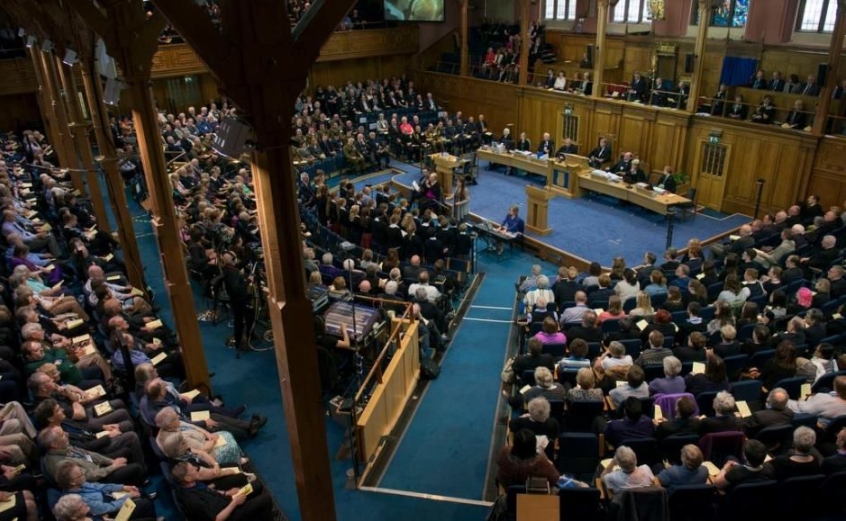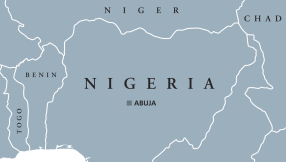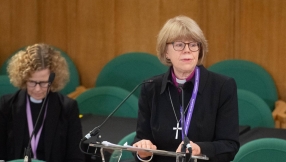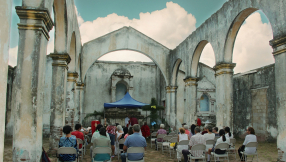
The Church of Scotland has said it is "broadly supportive" of plans to ban conversion therapy in Scotland but says it cannot give "unqualified support" at present.
The Scottish government says it wants to protect people "from the harm of conversion practices". Under current proposals, a crime will have been committed if so-called conversion practices have been "committed with the intent that the victim's sexual orientation or gender identity would be changed or suppressed". The recommended penalty is up to seven years in prison, a fine of up to £10,000, or both.
In its submission to the Scottish government's consultation, the Church of Scotland was largely supportive of the proposals but said it wanted to raise "several significant points and concerns at this stage".
It said that "much more detail will be required" in the final legislation to outline the kinds of scenarios that would constitute harm and intent. It also called for a "clearer overview of how the law might be applied".
"Example scenarios would be a helpful way to ensure as much clarity as possible both for faith groups and for the courts to interpret the proposed legislation," it said.
"Some of the scenarios raised in our internal discussions included instances where individuals requested pastoral care or prayer in order to resist sexual urges that might result in behaviour they themselves deemed incompatible with their beliefs.
"While consent may not be a complete defence for conversion practices, more detail is required as to how much of a role it might play as some grey areas remain."
In 2022, the Church of Scotland endorsed the definition of conversion therapy as outlined in the 'Memorandum of Understanding on Conversion Therapy in the UK', which calls the practice unethical and potentially harmful.
The General Assembly agreed to "urge the Scottish Government to ban conversion therapy and instruct the Church to make representations to the Scottish Government and Scottish Parliament".
The Church of Scotland's position is in stark contrast to the Catholic Church and other Christian groups that have expressed concerns about the potential impact on religious freedom and the rights of parents.
The Evangelical Alliance has called the proposals "problematic".
"The proposals create broad new criminal and civil offences and lack clarity as to how they would impact the everyday activities of churches and Christians," it said.
"Underlying many of the problems with these proposals is the implicit characterisation of Christian teaching on sex and sexuality as inherently harmful.
"Therefore, there is significant risk that these measures would lead to the criminalisation of such activity, including prayer, discipleship, even in cases where support is sought and desired by an individual."
It continued, "The Evangelical Alliance has consistently affirmed that forced or abusive behaviour should not be permitted. However, action to address this needs to ensure that that is what is in scope and it does not restrict people from accessing the support they choose, or unintentionally criminalise Christian ministries.
"We wholeheartedly oppose coercive behaviour but are concerned that discipleship and support within a community with clear convictions on sexual practice could be construed as directive and therefore fall foul of the law. "
The Alliance Defending Freedom UK (ADF) said that the legislation risks criminalising parents who do not support their child's desire to transition.
Lois McLatchie Miller, ADF UK spokesperson for Scotland, said, "Common-sense parenting is not a crime. Under these draconian proposals, the Scottish government would place parents under a terrifying and well-founded fear of losing their children or being locked up in prison for saying something contrary to the favoured ideology of the day.
"The proposed law would violate fundamental human rights, starting with the right and duty of parents to protect their children, in addition to religious freedom and free speech rights, including for those in a position to give pastoral support.
"Children are not adults, and parents are not children. The vast majority of parents are committed to doing the sometimes difficult job of raising their children well. They deserve support and protection, not suspicion.
"Many hold firm, science-based beliefs in the immutability of biological sex. They have concerns grounded in the real-life testimonies of those who felt pushed into life-altering decisions that proved to be no solution. Parents must be supported to raise their children; not criminalised for protecting them."
A spokesperson for the Catholic Church in Scotland said that religious bodies must be free to teach their beliefs and support those who wish to live in accordance with those beliefs.
"We would urge the Scottish Government not to criminalise mainstream religious pastoral care, parental guidance, and medical or other professional intervention relating to sexual orientation, which is not approved by the State as acceptable," a spokesman for the Church said.
"The worrying lack of clarity about what is meant by the term 'conversion practices' could create a chilling effect and may criminalise advice or opinion given in good faith."













